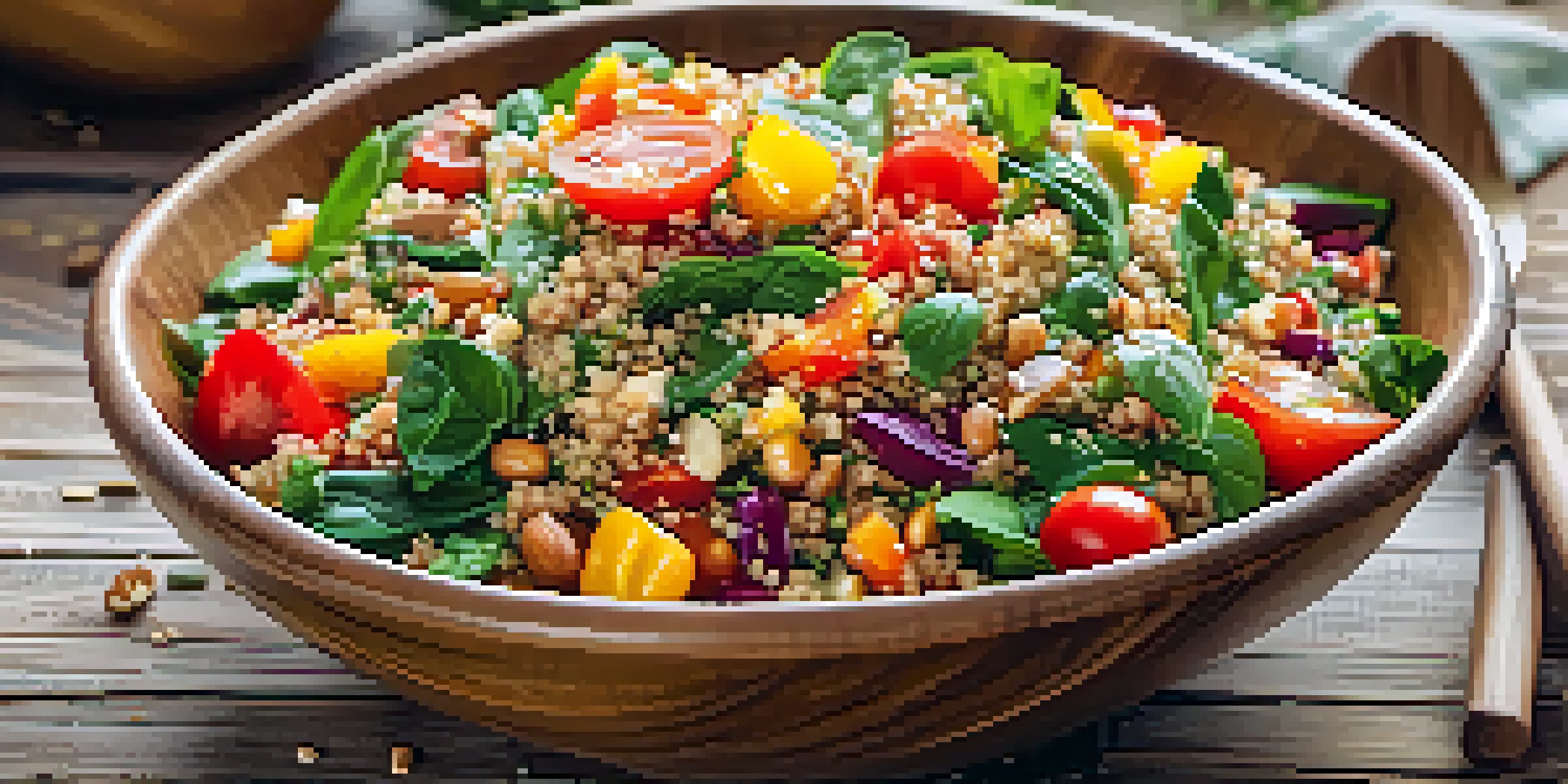Gluten Sensitivity: Challenges for Vegetarian Diets

Understanding Gluten Sensitivity and Its Symptoms
Gluten sensitivity, often confused with celiac disease, can lead to various uncomfortable symptoms like bloating, fatigue, and headaches. It occurs when the body reacts negatively to gluten, a protein found in wheat, barley, and rye. Many people experience these symptoms after consuming gluten-rich foods, which can significantly affect their quality of life.
Let food be thy medicine and medicine be thy food.
For vegetarians, the challenge intensifies since many staple foods, such as bread, pasta, and cereals, contain gluten. This can lead to a limited food selection, making it difficult to maintain a balanced diet. Understanding the symptoms and triggers is the first step toward managing gluten sensitivity effectively.
It's essential for those with gluten sensitivity to listen to their bodies and consult healthcare professionals. This understanding can pave the way for a more tailored approach to diet, ensuring that they can enjoy meals without discomfort.
The Intersection of Vegetarianism and Gluten Sensitivity
Vegetarianism promotes a plant-based diet that is rich in fruits, vegetables, legumes, and grains. However, for individuals with gluten sensitivity, this can pose unique challenges, particularly with grains. Many common vegetarian protein sources, like whole grain bread and pasta, may not be suitable, leading to potential nutritional gaps.

A vegetarian diet often relies on grains for energy and fiber, but gluten-containing grains can be detrimental for those with gluten sensitivity. This means vegetarian eaters must be more creative with their food choices, substituting gluten-free options like quinoa, rice, and gluten-free oats.
Gluten Sensitivity Symptoms Explained
Gluten sensitivity can cause discomforting symptoms like bloating and fatigue, affecting daily life.
Navigating this intersection requires a thorough understanding of both dietary principles. By being informed about gluten-free grains and proteins, vegetarians can create satisfying meals that cater to their dietary restrictions.
Identifying Gluten-Free Vegetarian Protein Sources
Finding protein sources that are both vegetarian and gluten-free is crucial for those with gluten sensitivity. Legumes like lentils, chickpeas, and black beans are excellent options, packed with protein and fiber. Nuts and seeds, such as almonds, chia seeds, and hemp seeds, are also great additions to a gluten-free vegetarian diet.
The greatest wealth is health.
Incorporating tofu and tempeh can add variety and protein without the gluten. These soy-based products are versatile and can be used in countless dishes, from stir-fries to salads. Additionally, there are now many gluten-free meat alternatives available on the market, providing even more options for vegetarians.
Being creative in the kitchen can lead to delicious and nutritious meals that satisfy both dietary needs. Experimenting with different flavors and textures can make the gluten-free vegetarian experience enjoyable and fulfilling.
Reading Labels: The Importance of Ingredient Awareness
For those with gluten sensitivity, reading labels is key to avoiding gluten. Many processed foods, including vegetarian options, may contain hidden gluten, so vigilance is necessary. Ingredients like malt, modified food starch, or even certain sauces can be problematic, making label reading a vital skill.
Understanding what to look for on packaging can prevent accidental gluten consumption. Foods labeled 'gluten-free' are safer choices, but caution is still warranted as cross-contamination can occur during manufacturing. Familiarizing oneself with gluten-containing ingredients can empower individuals to make informed choices.
Navigating Vegetarian Gluten-Free Diet
Vegetarians with gluten sensitivity must creatively substitute gluten-containing grains with safe, nutritious options.
As awareness grows, more brands are offering gluten-free vegetarian products. This shift in the market can be a game changer, allowing those with gluten sensitivity to enjoy a wider variety of foods without compromising their dietary preferences.
Creative Gluten-Free Vegetarian Meal Ideas
When it comes to meal ideas, the options for gluten-free vegetarian dishes are plentiful. Think hearty quinoa salads, packed with vegetables, nuts, and a zesty dressing, or delicious stir-fries featuring tofu and a rainbow of veggies. These meals can be both satisfying and nourishing without the need for gluten.
Another fantastic option is to whip up a chickpea curry served with rice or cauliflower rice. This dish is not only naturally gluten-free but also bursting with flavor and protein. Exploring different cuisines can also inspire new recipes that cater to both vegetarian and gluten-free requirements.
With creativity and a little planning, anyone can enjoy a variety of delicious meals that meet their dietary needs. Embracing gluten-free alternatives and experimenting with diverse ingredients can lead to a fulfilling culinary experience.
Nutrition Considerations for Gluten-Free Vegetarians
Maintaining nutritional balance can be tricky for gluten-free vegetarians. Since gluten-containing grains often provide essential nutrients, it's important to ensure that alternative sources are included. Focusing on whole, nutrient-dense foods can help fill any gaps left by avoiding gluten.
Key nutrients to watch include fiber, B vitamins, iron, and protein. Incorporating a variety of fruits, vegetables, legumes, nuts, and gluten-free grains can help meet these nutritional needs. Consulting with a registered dietitian can also provide tailored advice and meal planning support.
Importance of Ingredient Awareness
Reading labels and understanding hidden gluten in processed foods is crucial for those with gluten sensitivity.
Being proactive about nutrition can lead to a healthy and vibrant lifestyle. With the right knowledge and resources, gluten-free vegetarians can thrive while enjoying a diverse range of foods.
Seeking Support and Resources for Gluten Sensitivity
Finding a supportive community can make a world of difference for those navigating gluten sensitivity on a vegetarian diet. Online forums, local support groups, and social media can connect individuals with similar experiences, sharing tips, recipes, and encouragement. This sense of community can be invaluable, especially during challenging times.
Additionally, numerous resources are available, from specialized cookbooks to blogs dedicated to gluten-free vegetarian cooking. These resources can offer inspiration and practical advice, helping individuals create meals that cater to their dietary needs without sacrificing taste.

Reaching out for help and sharing experiences can empower those facing gluten sensitivity. By building a network of support, individuals can feel less isolated and more equipped to manage their dietary choices.